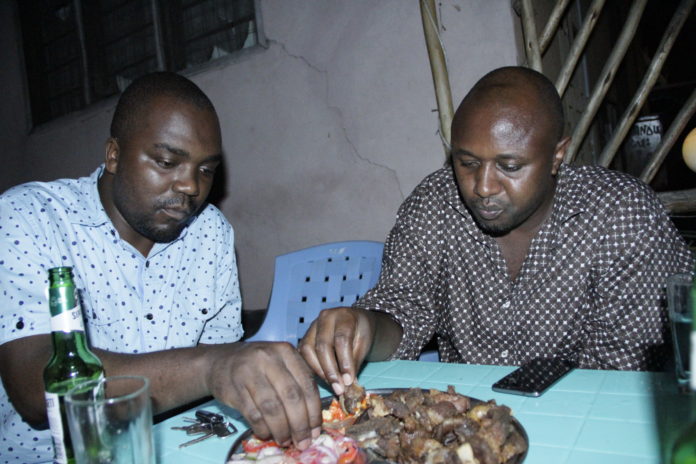Dar es Salaam — It’s busy Sunday evening at Shekilango road, a bustling neighborhood in Dar es Salaam dotted with bars and nightclubs that can be likened to Bourbon Street at New Orleans, Louisiana in the United States.
Dozens of young female customers in dazzling outfits are huddling at a smoke-belching kitchen, placing their orders to the wide-eyed chef.

BREAKING THE TRADITION
Unlike in conventional restaurants, Kitimoto customers proceed directly to the kitchen to place their orders and select the portions of raw meat, unsteadily hanging on a metal holder.
The knife-brandishing chef in a white apron then slices the portions, weighs it on the scale, and starts the preparation for cooking.
The meat is then anointed with a number of spices including soy sauce, vinegar, pepper, and ginger, and placed on a hot grill for comfortable slow cooking or tossed in hot oil.
“Most customers prefer extra juicy meat mixed with plantain (green bananas) and vegetable salad aside,” said Justine Mrosso, a cook at JJ bar in Dar es Salaam.
A loud music play as revellers sitting on a maze of wooden stalls guzzle rounds of a top-selling Serengeti light beer while watching portions of their pork sizzling on a grill. A gush of aromatic steam wafts a loudly chattering customers anxiously wait for a savory tasty meat.
HOW TO MAKE IT TASTY
Kitimoto—Swahili word literary meaning unbearably “hot seat” refers to spicy and fastidiously grilled pork chops that local chefs leave them sizzling on a slow-cooking charcoal grill or deep fry them in hot oil. The pork chops are often slathered in succulent vegetable stew containing tomatoes, onions, and green peppers.
Despite its popularity, you can hardly find Kitimoto conspicuously displayed on menus of conventional restaurants in the port city of Dar es Salaam. To enjoy this delicacy, a customer has to go to the streets and get right into the kitchen.
“We are a civilized community, the fact that one’s religion does not allow feasting on pork does not mean everybody should avoid eating it. You must do your best to enjoy your food without offending anyone, that’s why we come straight to the kitchen,” said Caesar Malleo, a Kitomoto customer.
ORIGIN AND POLITICAL SIGNIFICANCE
Apparently nobody knows, how the word Kitimoto was ascribed to sumptuous pork dish. According to some unsubstantiated claims, some people whose religious beliefs strictly prohibit pork eating, they found it irresistible, wore cloak and sneak into the kitchen, frantically placing their order and eat the meat while nervously seated on their “hot seat” avoiding to see someone they know.
Kitimoto meat is also linked to a foiled political turmoil in 1993 when Muslim religious fundamentalists torched pig slaughterhouses and restaurant serving pork claiming eating pork contradicted their religious beliefs.

LIBERALIZING SOCIAL VALUES
Under the leadership of President Ali Hassan Mwinyi, who reversed failed socialist policies under the country’s founding leader Julius Nyerere in the 1980s, import restrictions were relaxed and private enterprises encouraged.
President Mwinyi also known as Mzee Ruksa meaning (everything is allowed) is hailed for liberalizing morals, beliefs, values, and the economy without necessarily breaking the law.
President Mwinyi, a devout Muslim, strongly criticized die-hard Islamic radicals who set ablaze the butcheries insisting that Tanzania was a free country and that people were free to eat anything as long as they don’t break the law.

At Kibo Bar and Restaurant located at Bahari Beach area in the outskirts of Dar es Salaam, every customer has a story to tell about their experience eating a lovely moist, evenly cooked roast pork surrounded by sharp crackling crisp.
“It’s very delicious, I feel like coming here every day to enjoy this delicacy,” said Ester Timbuka, a resident of Dar es Salaam.
“Cooking a perfect roast pork is easy once you know the right tricks,” said John Mrema a chef at Kibo bar.
Mrema, a seasoned chef with more than two decades experience, slices a spare rib to remove a blade bone, rolls and ties the meat to a neater joint.

“Most customers don’t realize portion surrounding the head of the pig is usually more succulent because of a reasonable layer of unsaturated fat underneath,” he said.
From the tenderloin to the leg and belly, Mrema knows how to roast fresh-looking pork to perfection to the satisfaction of a legion of his customers.
“Although many customers avoid joints with fat, it adds flavor. You don’t have to eat the fat unless you want to,” he said.
According to Mrema making delicious and perfect pork portions requires experience and a cooking technique that not every chef knows.
An important part of cooking any meat is to let it rest after it’s removed from the oven, he said adding “Once cooked, remove the pork from the roasting tin and place it onto a serving plate.”
While there are many theories about the origin of the name, nobody knows for sure how it started.
To avoid unnecessary tension, street kitchens ascribed Swahili code names such as Mbuzi Katoliki (catholic goat) Mdudu (Insect) Mnyama (animal) apparently to avoid offending the Islamic community.
Timbuka said unlike beef, pork is lean, succulent, and irresistibly tasty.
“I usually place my order and tell the chef to serve it with Ugali (maize meal) and local salad,” she said.
Depending on the place, a kilo of roast pork fetches between 12,000 to 15,000 Tanzanian shillings.

